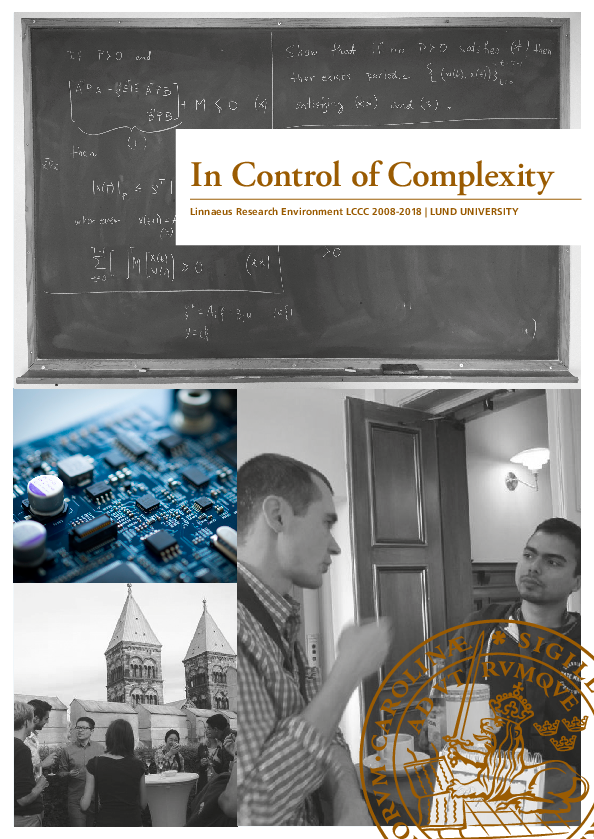
LCCC - Lund Center for Control of Complex Engineering Systems
LCCC is a Linnaeus environment at Lund University funded by the Swedish Research Council since 2008.
Our society is dependent on flexible infrastructure for industrial production, energy supply and communication systems. This requires research and innovations on control of complex systems. Many challenges are common to a wide range of application areas and need to be adressed using a combination of competences from control, communications and computer science.
LCCC is developing theory, methods and tools for control of large-scale engineering systems. Positions for PhD students and postdocs in prioritized areas are combined with short term guest programs of a wider scope. This contributes to creating a highly creative and stimulating environment, that attracts strong applicants at all levels.
LCCC says thank you!
The Linnaeus environment Lund Center for Control of Complex Engineering Systems (LCCC) is now coming to an end after 10 years of Swedish Research Council funding.
LCCC has been a very successful research environment where numerous exciting, often interdisciplinary, research results have been obtained. This has become possible through collaborations across borders, connecting subjects, departments and nations. One of the pillars in this work has been the workshops and focus periods where young and more established scientists have met, presented their results, discussed and created new bonds.
We now proudly present some of the highlights in a summing up brochure (pdf version on the right). Here you will find an overview of the 10 years, the basic ideas of LCCC when it comes to research success, delvings into specific projects and professional cooperations.
This 10 year period with LCCC has been expansive and very instructive for the participating departments as well as for individual researchers. The outcomes of the LCCC experience, the new contacts and new perspectives on how to work, will now be taken along into new projects inspired and initiated by the Linnaeus environment.
We are now closing with a focus period on Learning and Adaptation for Sensorimotor Control. Welcome to all visiting scholars, invited speakers and participants!
Experiences
"I believe that the value of the Linnaeus Lund Center for Control of Complex Engineering Systems to the academic community has been immense. I truly hope that an analogous structure will succeed LCCC at Lund soon, and that it will continue along similar lines in the future." Tryphon Georgiou, University of California, USA (invited speaker 2014 and 2017)
"The LCCC workshop was an excellent platform to discuss the latest trends in automation.[] The format of the workshop was very fruitful. I found the discussion rounds, expertly facilitated by Charlotta Johnson incredibly useful.
[] I am incredibly impressed with the number of control engineers at LCCC which I believe are the centre’s greatest assets." Margret Bauer, University of Pretoria, South Africa (invited speaker 2016)
"Right after my licenciate defense at KTH, I could join the focus period at Lund, which gave me the opportunity to receive constructive feedback on my own research from renowned researchers in the field, get to know different aspects and approaches as well as establish both personal and professional contacts. It was a warm and welcoming environment where students could not only collaborate with the other participants but also enjoy their time together in and around nice Lund." Arda Aytekin, KTH (visiting scholar 2017)
"The highlight of the focus period was a 3-day workshop with an impressive participation of world-leading researchers. It was an unforgettable experience and a great opportunity to get together with other students and researchers from all over the world. The hosts in Lund did a wonderful job in creating a welcoming and open environment, which made it easy to establish new links and friendships, many of which last until today." Johannes Schiffer, Brandenburg University of Technology, Germany (visiting scholar 2014)
"I think it was a great environment for early career academics, to help them make connections with new colleagues. During my visit, I started a line of research that I am still pursuing to do this day. I am still very grateful for the opportunity I had to visit LCCC. I very much enjoyed my time in Lund, especially the collegial environment in the Department of Automatic Control." Stacey Patterson, Rensselaer Polytechnic Institute (visiting scholar 2010)
focus period on Learning and Adaptation for Sensorimotor Contro"Primarily, my visits gave me a lot of inspiration and motivation. The members of the LCCC are smart, friendly and cooperative researchers, open to discussions and genuinely curios about new problems in applied mathematics and engineering. The atmosphere is both relaxed and productive, with a strong “community” spirit: members make time to attend internal seminars and engage in stimulating discussions. [] In my opinion, the LCCC is very valuable to the academic community. On one side, the LCCC hosts well established researcher that greatly contribute with their activities, project and collaborations to the community. There is a lot of knowledge and passion about systems & control, robotics, modeling and so on. On the other side, the LCCC is very welcoming to foreign PhD students and visitors. I believe that both aspects complement each other and activities such as the Focus Periods are really effective in making ideas circulate and develop." Wilbert Samuel Rossi, University of Twente (visiting scholar 2014)
Thank you to our advisory board
John Baras, University of Maryland, USA
Maria Domenica di Benedetto, University of L'Aquila, Italy
Tor Arne Johansen, Norwegian University of Science and Technology, Norway
Fadil Santosa, University of Minnesota, USA
Françoise Lamnabhi-Lagarrigue, Laboratory of Signals and Systems, France
Tarek Abdelzaher, University of Illinois at Urbana-Champaign, USA
Keith Glover, University of Cambridge, UK
Graham Goodwin, University of Newcastle, Australia
Clas Jacobson, United Technologies Research Center, USA
Richard Murray, Caltech, USA
Jakob Stoustrup, Aalborg University, Denmark